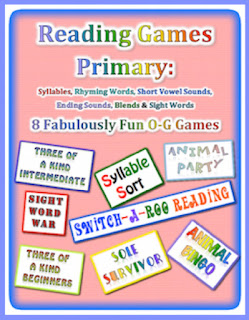This week I wanted to tell you about my online store, Good Sensory Learning. I’m Dr. Erica Warren, and I established this site so I could share all the materials that I have created over the last 20+ years as a learning specialist and educational therapist. When I first began my private practice, Learning to Learn, I had great difficulty finding fun and multisensory materials for my students that were effective and engaging. So back in 2005, I made it my mission to design and distribute high-end, remedial products as well as memorable, motivating lessons that bring delight to learning. If you would like to try a free sampling of my activities , CLICK HERE . How Are the Products Organized at Good Sensory Learning? You can download my Free Printable Catalog or you can browse the site using the grey “search all products” bar in the top right of any page with keywords such as dyslexia, working memory, and executive functioning. What’s more, drop down menus in the red banner allow you t...
For many struggling readers, sight words can seem like an impossible hurdle. Sight words are high-frequency words that are commonly seen when reading and used when writing. Students are encouraged to memorize these words by sight because most do not follow standard decoding rules and can not be "sounded out."

What if a Student Struggles with Visual Memory?
Over the years, I have tried a multitude of strategies to help my struggling students master sight words. Repetitive, multisensory lessons were a bore, games were a great improvement, but the best technique, to begin with, is creating a multisensory memory book. Instead of expecting students to use rote, visual memory, I like to teach my students hooking strategies and have them record their ideas with colorful markers in booklets or notebooks. It is a word diary of sorts that students can title with their own fun, creative name (e.g., magical memory strategies...).
Each difficult sight word is placed on its own page, and students have fun coming up with memory strategies that help them remember the correct pronunciation and spelling. For example, if Peter has difficulty with the word “together,” he may discover that the word is made up of three simple words – to, get and her. As another example, if Sue struggles with the word “what,” she may notice "what" has the word "hat" in it. She could draw a hat on the word "what" in her notebook and then write down the question, “What hat?” A final example is, if Terry cannot remember the word “hear.” Perhaps she discovers that it has the word "ear" in it. She could draw an ear on the word and then write the phrase, "we hear with our ear."
How Can I Make Strategies Memorable?
Self-generated strategies are most memorable, so I try to encourage my students to come up with their own. However, in the beginning, students may need some assistance. I explain that the word might look like something, sound like something, or have other familiar words in it. Some students see an interesting pattern within the letters and other students like to say the words the way they are written (e.g., Wed-nes-day.). Still, others might like to create a little rhyme, ditty or rap. The trick is to have the strategy hidden inside the word. It can even tell a story. For example, many have a hard time with the word "friend." They just can't remember that it includes the letter "i." If this is the case, they might want to say, "I have a friend to the end." Finally, the letters may be used to create a drawing. For instance, take the word, "who." Frank may draw an owl out of the letters - because he knows that an owl makes the same sound as the word "who."
How Do I Get Started?
Make sure that you have all the needed materials:
- Notebooks or booklets.
- Magic markers, colored pencils or crayons.
- Great imagination and playful attitude.
Remember, if you are excited about the lessons, your students will be too. Wrap this strategy in mystery, magic, and color and you will surely grab your students' attention and imaginations.
Cheers, Erica
· Blog: https://learningspecialistmaterials.blogspot.com/
· YouTube Channel: https://www.youtube.com/user/warrenerica1
· Podcast: https://godyslexia.com/
· Store: http://www.Goodsensorylearning.com/ & www.dyslexiamaterials.com
· Courses: http://www.learningspecialistcourses.com/
· Newsletter Sign-up: https://app.convertkit.com/landing_pages/69400

Comments
Post a Comment